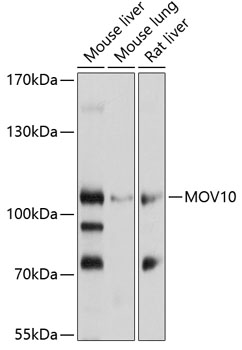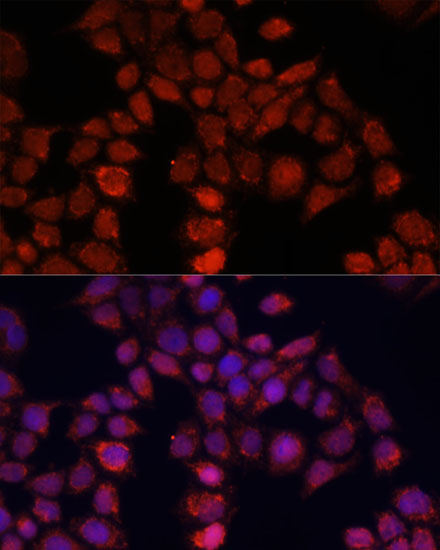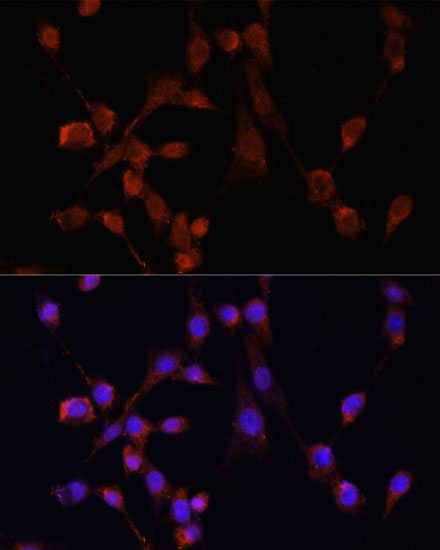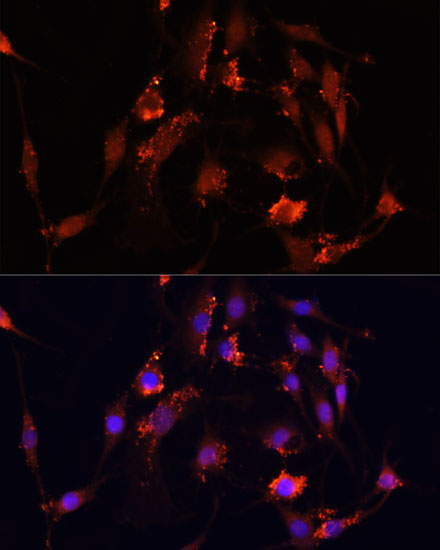-
Product Name
MOV10 Polyclonal Antibody
- Documents
-
Description
Polyclonal antibody to MOV10
-
Tested applications
WB, IF
-
Species reactivity
Human, Mouse, Rat
-
Alternative names
MOV10 antibody; fSAP113 antibody; gb110 antibody; putative helicase MOV-10 antibody
-
Isotype
Rabbit IgG
-
Preparation
Antigen: Recombinant fusion protein containing a sequence corresponding to amino acids 1-310 of human MOV10 (NP_066014.1).
-
Clonality
Polyclonal
-
Formulation
PBS with 0.02% sodium azide, 50% glycerol, pH7.3.
-
Storage instructions
Store at -20℃. Avoid freeze / thaw cycles.
-
Applications
WB 1:1000 - 1:2000
IF 1:50 - 1:200 -
Validations

Western blot - MOV10 Polyclonal Antibody
Western blot analysis of extracts of various cell lines, using MOV10 antibody at 1:1000 dilution.Secondary antibody: HRP Goat Anti-Rabbit IgG (H+L) at 1:10000 dilution.Lysates/proteins: 25ug per lane.Blocking buffer: 3% nonfat dry milk in TBST.Detection: ECL Basic Kit .Exposure time: 30s.

Immunofluorescence - MOV10 Polyclonal Antibody
Immunofluorescence analysis of HeLa cells using mov10 antibody at dilution of 1:100. Blue: DAPI for nuclear staining.

Immunofluorescence - MOV10 Polyclonal Antibody
Immunofluorescence analysis of NIH/3T3 cells using mov10 antibody at dilution of 1:100. Blue: DAPI for nuclear staining.

Immunofluorescence - MOV10 Polyclonal Antibody
Immunofluorescence analysis of PC12 cells using mov10 antibody at dilution of 1:100. Blue: DAPI for nuclear staining.
-
Background
5' to 3' RNA helicase contributing to UPF1 mRNA target degradation by translocation along 3' UTRs. Required for microRNA (miRNA)-mediated gene silencing by the RNA-induced silencing complex (RISC). Required for both miRNA-mediated translational repression and miRNA-mediated cleavage of complementary mRNAs by RISC. In cooperation with FMR1, regulates miRNA-mediated translational repression by AGO2. Restricts retrotransposition of long interspersed element-1 (LINE-1) in cooperation with TUT4 and TUT7 counteracting the RNA chaperonne activity of L1RE1. Facilitates LINE-1 uridylation by TUT4 and TUT7. Required for embryonic viability and for normal central nervous system development and function. Plays two critical roles in early brain development: suppresses retroelements in the nucleus by directly inhibiting cDNA synthesis, while regulates cytoskeletal mRNAs to influence neurite outgrowth in the cytosol (By similarity). May function as a messenger ribonucleoprotein (mRNP) clearance factor.; (Microbial infection) Required for RNA-directed transcription and replication of the human hepatitis delta virus (HDV). Interacts with small capped HDV RNAs derived from genomic hairpin structures that mark the initiation sites of RNA-dependent HDV RNA transcription.
Related Products / Services
Please note: All products are "FOR RESEARCH USE ONLY AND ARE NOT INTENDED FOR DIAGNOSTIC OR THERAPEUTIC USE"
